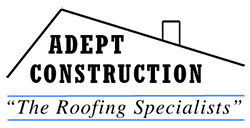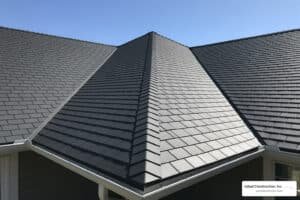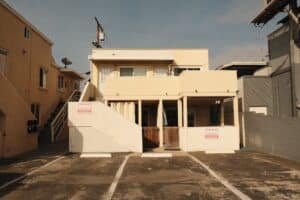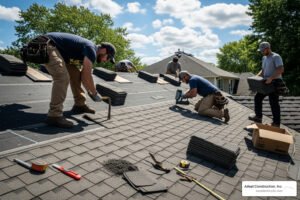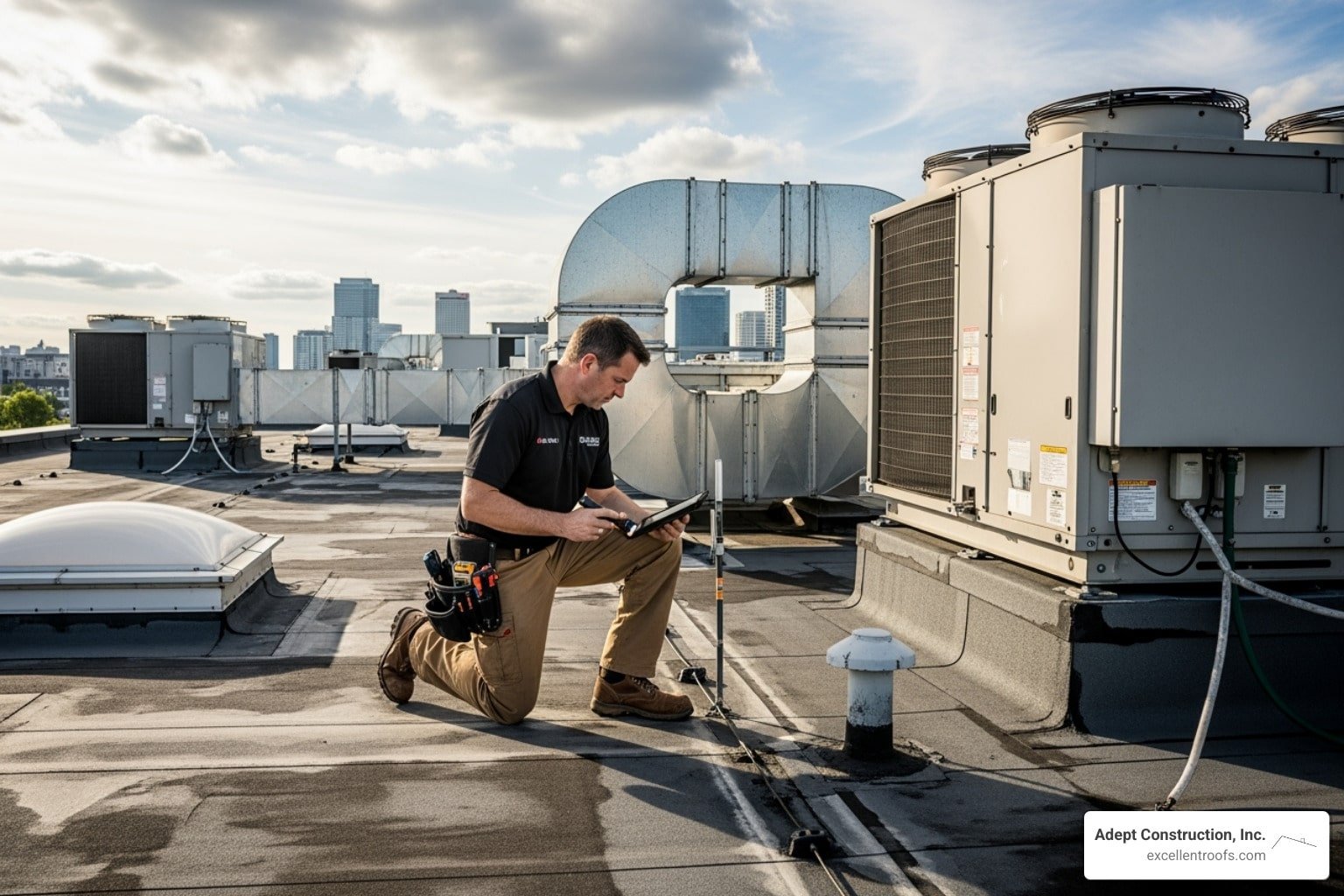
Why Understanding Commercial Roof Inspection Cost Matters for Your Property
Commercial roof inspection cost in the United States typically ranges from $250 to $1,000, with most property owners spending between $400 and $600. A professional inspection is the most cost-effective way to protect your property’s most critical asset. For property owners seeking reliable assessments, Adept Construction, Inc. has provided expert roofing services since 1997. A minor issue identified during a $500 inspection today can prevent a $15,000 emergency repair in the future.
The final price of an inspection depends on several key factors:
- Roof Size: Larger roofs require more time and resources to inspect.
- Inspection Type: Costs vary between visual, drone, and infrared thermal scans.
- Roof Complexity: Multiple penetrations, HVAC units, and unique materials increase the scope of work.
- Geographic Location: Local labor rates and market conditions affect pricing.
Regular inspections extend your roof’s lifespan, maintain warranty compliance, and provide essential documentation for insurance claims. In Illinois, where weather swings from harsh winters to heavy summer storms, roofs face constant stress. A thorough inspection catches issues like failing seams or hidden moisture early, when repairs are simple and affordable. Whether you manage a property in Naperville or Downers Grove, understanding these costs helps you budget wisely. Professional commercial roofing services always begin with a comprehensive assessment of your roof’s condition.
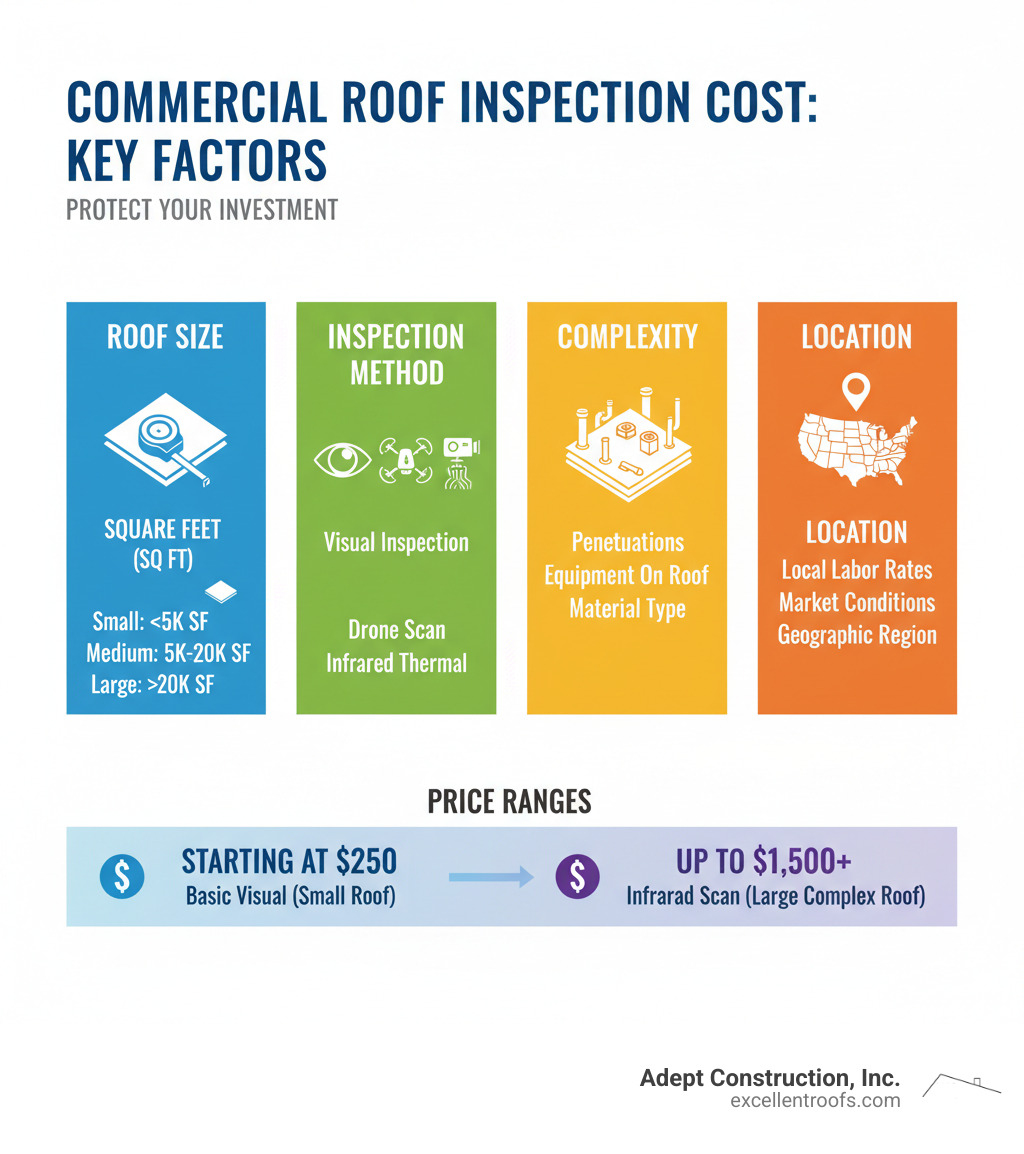
Understanding the Average Commercial Roof Inspection Cost
Across the United States, the commercial roof inspection cost typically falls between $250 and $1,000. For exceptionally large or complex properties, this can be higher. In Illinois, a basic inspection for a small commercial building starts around $350, while large industrial facilities can cost $1,250 or more. The national average hovers around $500, providing a useful benchmark.
The thoroughness of the inspection is the primary cost driver. A basic visual assessment is less expensive than an advanced evaluation with thermal imaging. For example, some contractors charge a base rate for a certain square footage (e.g., up to 25,000 sq. ft.) and then an additional per-square-foot fee beyond that. This rate increases with the complexity of the inspection, from $0.02/sq. ft. for visual checks to $0.10/sq. ft. for thermal moisture scans. These tiers reflect the time, expertise, and equipment needed to provide an accurate assessment from experienced roofing professionals.
Commercial Roof Inspection Cost by Size
Roof size is the most significant factor in determining inspection cost. Larger roofs require more time and resources to examine thoroughly.
- Small Roofs (under 5,000 sq. ft.): $250 to $400. Common for standalone retail shops or small office buildings.
- Medium Roofs (5,000 to 20,000 sq. ft.): $400 to $700. Includes mid-sized warehouses and larger retail establishments.
- Large Roofs (over 20,000 sq. ft.): $700 to $1,000+. For expansive industrial complexes and big-box stores, contractors often apply a per-square-foot rate for the area exceeding a certain threshold.
This tiered approach ensures fair pricing for properties in areas like Downers Grove and Naperville.
Factors That Influence Your Commercial Roof Inspection Cost
Beyond size, several variables impact the final price:
- Roof Complexity and Accessibility: A flat, simple roof is easier to inspect than one with multiple levels, slopes, and numerous penetrations (HVAC units, vents, skylights). Difficult access may require specialized equipment like lifts, increasing costs.
- Roofing Material: Different materials like TPO, EPDM, metal, or built-up roofs require specific knowledge and inspection techniques. An inspector’s expertise in your specific commercial roofing material is crucial for an accurate assessment.
- Geographic Location: Labor rates and operational costs vary by region. In Illinois, the average hourly charge for a roofer is around $85, but this can be 20-30% higher in certain suburbs due to a higher cost of doing business.
- Inspector’s Experience: Highly experienced inspectors with certifications in thermal imaging or specific roofing systems may charge more, but their expertise can identify subtle issues that others miss, saving money on future repairs or a premature roof replacement.
- Scope and Technology: A basic visual inspection is the most affordable, while advanced methods like drone or infrared inspections cost more but reveal hidden problems like trapped moisture, as detailed in the EPA’s moisture control guidance.
What’s Included in a Professional Inspection?
A professional commercial roof inspection is a systematic evaluation of the entire roofing system to identify existing problems and potential vulnerabilities. Inspectors methodically check for both obvious and subtle signs of trouble.
The inspection process typically covers the following key areas:
- Membrane Condition: Checking for aging, wear, punctures, blisters, or cracks in the primary roofing material.
- Flashing and Seams: Inspecting these critical transition points around walls, skylights, and vents, as they are the most common sources of leaks.
- Drainage System: Ensuring gutters, downspouts, and drains are clear and functional to prevent ponding water, which accelerates roof deterioration.
- Ponding Water and Moisture Intrusion: Actively searching for areas where water collects and for evidence of moisture intrusion, both on the roof and inside the building.
- Penetrations and Equipment: Examining the seals and flashing around all rooftop equipment, such as HVAC units, pipes, and vents.
- Structural Assessment: Looking for visible signs of structural stress, like sagging or bowing, that may indicate underlying issues.
- Interior and Attic Spaces: When accessible, checking for leaks, mold, or damaged insulation, as improper ventilation is a leading cause of premature roof failure.
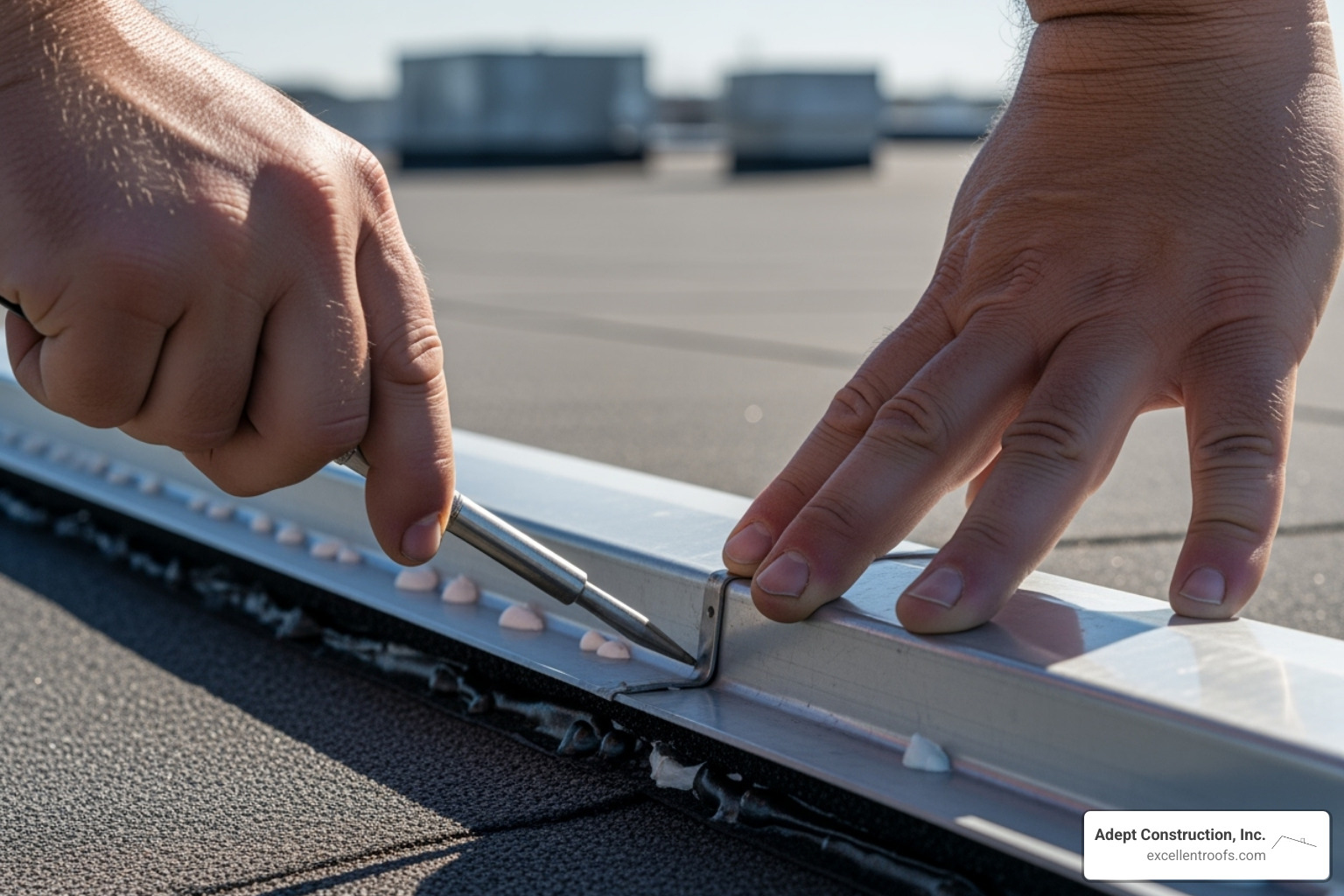
Comparing Inspection Methods and Costs
The inspection method directly impacts the commercial roof inspection cost and the level of detail provided.
- Visual Inspection ($250-$500): A hands-on assessment where a professional walks the roof to identify visible damage. It is the most common and cost-effective method for routine checks.
- Drone Inspection ($300-$1,000): Uses high-resolution cameras to capture aerial imagery, ideal for large, steep, or hard-to-access roofs. It provides excellent documentation and a comprehensive overview.
- Infrared (Thermal) Inspection ($500-$1,500+): Employs specialized cameras to detect temperature differences caused by trapped moisture within the roof assembly. This method is invaluable for finding hidden leaks before they cause significant damage.
The Final Deliverable: The Inspection Report
Following the assessment, you receive a comprehensive report that is a critical tool for property management and budgeting. A professional report includes:
- Photographic Documentation: High-resolution photos, drone footage, or thermal images illustrating any identified issues.
- Detailed Condition Description: A narrative summary of the roof’s overall health.
- Prioritized Issues: A categorized list of problems based on urgency (e.g., critical, significant, minor).
- Actionable Recommendations: Specific guidance for repairs and routine maintenance.
- Budgetary Estimates: Approximate costs for the proposed work to aid in financial planning.
- Lifespan Assessment: An expert estimate of the roof’s remaining service life.
This report serves as a vital record for warranty compliance and insurance claims. You can find further details on what to expect during a roof inspection in our detailed guide.
The ROI of Regular Inspections: Why It’s Worth the Cost
The true cost of a roof inspection is not what you pay, but what you save. A proactive inspection costing a few hundred dollars can prevent tens of thousands of dollars in emergency repairs, inventory damage, and operational disruptions. The financial return on investment (ROI) from regular inspections is realized through several key benefits:
- Extends Roof Lifespan: Proactive maintenance can extend your roof’s service life by 5-10 years or more, significantly delaying the capital expense of a full replacement.
- Reduces Repair Costs: Regular inspections identify minor issues like failing seams or small punctures when they are simple and inexpensive to fix. Left unaddressed, these problems escalate into major failures.
- Maintains Warranty Compliance: Most commercial roofing manufacturers require documented periodic inspections to keep warranties valid. Skipping them can void your coverage, leaving you liable for costs that would otherwise be covered.
- Strengthens Insurance Claims: A detailed inspection report from before a storm provides undeniable proof of your roof’s prior condition. This documentation is invaluable for ensuring you receive fair compensation for storm damage.
- Improves Energy Efficiency: A well-maintained roof with intact insulation and no moisture intrusion performs better thermally, leading to lower heating and cooling costs.
- Enables Proactive Budgeting: Inspection reports provide a clear roadmap of upcoming maintenance needs, allowing you to plan and budget for expenses rather than reacting to emergencies.
Properties in areas like Naperville and Downers Grove with regular inspection schedules consistently experience fewer emergencies, longer-lasting roofs, and lower overall maintenance costs. It is preventative medicine for your building. For comprehensive protection, explore our full range of commercial roofing services.
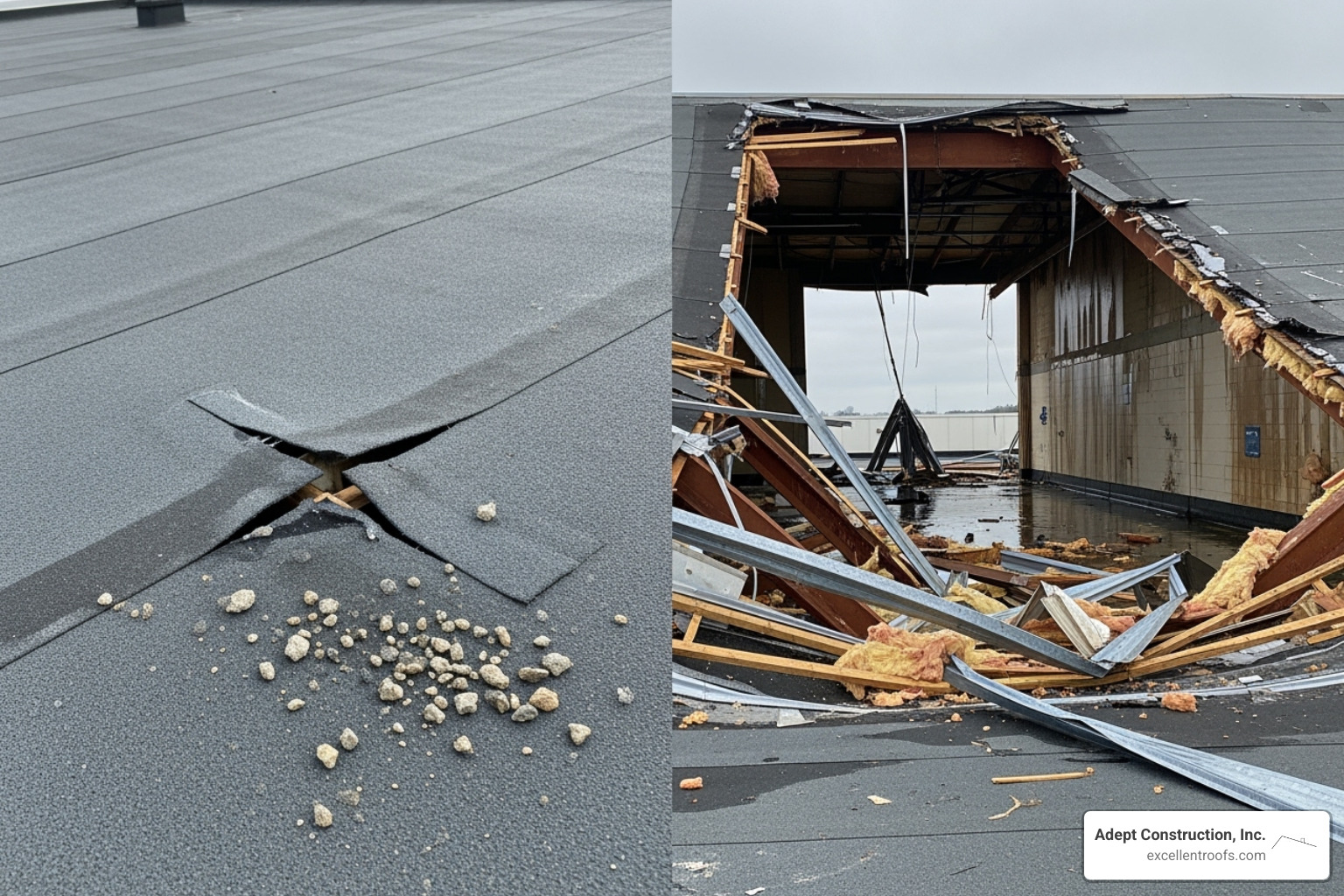
Choosing a Qualified Inspector in Illinois
Selecting the right inspector is critical for protecting your commercial property. In Illinois, you need a licensed, insured contractor with specific experience in commercial roofing in Illinois, not just residential work.
Key qualifications to look for include:
- Licensing and Insurance: Verify their Illinois roofing license (commercial licenses begin with 105) and ensure they have comprehensive liability and workers’ compensation insurance.
- Commercial Experience: Look for a proven track record with commercial systems like TPO and EPDM. A residential roofer may not recognize the unique challenges of flat roofs or commercial HVAC penetrations.
- Strong Reputation: Check online reviews on Google, Yelp, and the BBB. A substantial number of positive reviews indicates consistent customer satisfaction.
- Transparent Process: A trustworthy inspector provides a detailed written report with photos and offers clear, upfront pricing without high-pressure sales tactics.
Working with local experts provides distinct advantages. A roofing contractor in Downers Grove or an established company in Naperville understands local weather patterns and building codes, leading to more accurate assessments. This relationship is invaluable when you eventually need roof repair in Downers Grove or a roof replacement in Naperville IL.
How to Save Money on Inspections
Managing your commercial roof inspection cost is possible without sacrificing quality.
- Enroll in Maintenance Plans: Many contractors offer annual or bi-annual programs that include inspections at a discounted rate.
- Get Multiple Quotes: Request proposals from at least three qualified contractors to compare pricing and scope. Be wary of bids that are significantly lower than others, as they may indicate a less thorough inspection.
- Bundle Services: If you are already scheduling other exterior work, ask about bundling an inspection to potentially reduce overall costs.
- Keep Detailed Records: Providing your inspector with a history of past inspections and repairs can help them work more efficiently, potentially lowering costs.
Frequently Asked Questions about Commercial Roof Inspections
Here are direct answers to the most common questions property owners have about commercial roof inspections.
How often should a commercial roof be inspected?
A commercial roof should be professionally inspected at least twice a year, typically in the spring and fall. This schedule, recommended by the National Roofing Contractors Association (NRCA), allows for assessing winter damage and preparing the roof for harsh winter weather. An additional inspection is crucial after any severe weather event, such as a hailstorm or high winds. You can learn more about optimal roof inspection frequency on our blog.
How long does a commercial roof inspection take?
An inspection can take anywhere from one to six hours. A simple, small roof may only take an hour or two. A large, complex industrial facility with multiple levels and rooftop units can require four to six hours, especially if the inspection includes advanced methods like infrared scanning or drone operation. A professional will provide a time estimate based on your property’s specific characteristics.
Can I perform a DIY inspection to save money?
No, a DIY inspection is not a substitute for a professional assessment and can cost you more in the long run. There are three primary reasons to hire a professional:
- Safety: Professionals are trained in fall protection and know how to steer various roof types safely. A fall is not worth the minimal savings on a commercial roof inspection cost.
- Expertise: Trained inspectors can identify subtle signs of impending failure—like minor seam separation or UV damage—that an untrained eye would miss. They have the experience to distinguish between cosmetic issues and urgent problems.
- Warranty and Insurance: Most commercial roof warranties and insurance policies require documentation from a certified professional to remain valid. A DIY inspection report will likely be rejected during a claim.
While visual checks from the ground are useful, they cannot replace a comprehensive professional assessment. The small investment in a professional inspection—typically $250 to $1,000—protects you from missing critical issues that lead to far more expensive emergencies.
Secure Your Investment with a Professional Inspection
Your commercial roof is a critical asset that protects your business from the elements. Understanding the commercial roof inspection cost is the first step toward making smart, proactive decisions to safeguard your property.
A professional inspection is a high-value investment. For a modest fee, you receive a complete assessment of your roof’s health, a clear plan for maintenance, and the documentation needed to maintain your warranty and support insurance claims. Investing in regular inspections allows you to prevent costly emergencies, extend your roof’s service life, and manage your budget effectively.
Since 1997, Adept Construction, Inc. has provided Illinois property owners with honest, thorough assessments. Our experienced team uses proven techniques and modern technology to give you accurate information you can act on. We serve businesses throughout the Chicago suburbs, including Downers Grove and Naperville, delivering detailed reports that empower you to make informed decisions.
Don’t wait for a leak to tell you there’s a problem. The best time to inspect your roof is before you think you need to.
Contact us today for a free estimate on your commercial roofing inspection. Let us help you create a plan to protect your investment for years to come.

